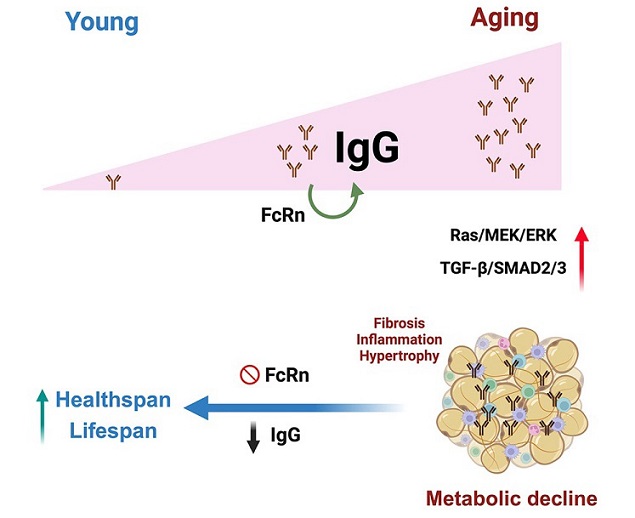Anti-Aging: Immunoglobin G (IgG) Found To Be The Driving Factor In Human Aging And Targeting It Could Slow Down Aging
Nikhil Prasad Fact checked by:Thailand Medical News Team Apr 29, 2024 1 year, 9 months, 2 weeks, 3 days, 8 hours, 34 minutes ago
Anti-Aging: Aging is an inevitable part of the human experience, marked by a myriad of changes that impact lifespan, quality of life, and overall health. As individuals age, they often face health challenges and conditions that reduce their ability to lead active and fulfilling lives. Scientists and researchers have long sought to understand the mechanisms behind aging, with the goal of finding ways to mitigate its adverse effects and prolong healthy lifespan.
 Graphical Abstract: IgG is an aging factor that drives adipose tissue fibrosis and metabolic decline.
The Role of Immunoglobulin G (IgG)
Graphical Abstract: IgG is an aging factor that drives adipose tissue fibrosis and metabolic decline.
The Role of Immunoglobulin G (IgG)
Recent groundbreaking research by Professor Qiang Li's team from Peking University School of Basic Medical Sciences, in collaboration with Professor Wang Liheng's team from Colombia University, New York-USA, has shed new light on the role of immunoglobulin G (IgG) in the early stages of human aging. IgG, a type of antibody crucial for immune function, has been identified as a significant driver of aging, particularly in its association with metabolic decline.
Insights from the Study
The study represents a paradigm shift in aging research. Rather than focusing solely on the outcomes of aging, such as age-related diseases, the study team delved into the root causes, pinpointing IgG accumulation as a pivotal factor.
What makes this discovery even more impactful is the revelation that IgG begins to accumulate in adipose tissue at a remarkably early age, highlighting the urgency of understanding and addressing this process.
Understanding IgG Accumulation and Aging
The research teams conducted comprehensive studies on both human and mouse adipose tissue, charting the correlation between age progression and IgG concentration. They found that excessive IgG in white adipose tissue can trigger detrimental effects such as fibrosis, inflammation, and insulin resistance, all of which contribute to accelerated aging and a decline in metabolic health.
Caloric Restriction as a Mitigating Factor
One promising finding from the study is the role of caloric restriction (CR) in mitigating IgG accumulation and its associated effects on adipose tissue. CR was found to reduce IgG accumulation, thus preserving adipose tissue function and overall metabolic health. This suggests that dietary interventions and lifestyle modifications may play a crucial role in delaying the aging process and promoting healthy aging and could serve as key
Anti-Aging strategies.
Insights into Mechanisms and Interventions
The study also delved into the mechanisms behind IgG's impact on aging, highlighting its activation of macrophages and subsequent induction of adipose tissue fibrosis via the TGF-β/SMAD pathway. Furthermore, the researchers identified the neonatal Fc receptor (FcRn) as a key player in IgG recycling, offering a potential target for intervention. Ta
rgeting FcRn through methods like antisense oligonucleotide therapy showed promising results in rejuvenating metabolic health in aged mice, hinting at a novel strategy for combating aging-related decline.
Implications for Future Research and Healthcare
The implications of this research are profound, paving the way for future studies aimed at unraveling the intricate mechanisms of aging and developing targeted interventions. By understanding and addressing factors like IgG accumulation early in life, medical providers may be able to offer more effective preventative care, prolonging healthy lifespan and enhancing overall quality of life for aging individuals.
Conclusion
In conclusion, the discovery of IgG as a driving factor in the early stages of human aging represents a significant leap forward in aging research. With a deeper understanding of IgG's role, coupled with innovative approaches to intervention, we may be on the brink of transformative advancements in promoting healthy aging and extending healthspan and lifespan. As we continue to unravel the complexities of aging, the quest for a healthier, more vibrant aging population remains a paramount goal in scientific and medical endeavors.
The study findings were published in the peer reviewed journal: Cell Metabolism.
https://www.cell.com/cell-metabolism/abstract/S1550-4131(24)00015-9
For the latest on
Anti-Aging, please keep on logging to Thailand Medical News.
